#The Texas Tribune
Text
Just a few years ago, maternal mortality was the rare reproductive justice issue that seemed to transcend partisan politics. In late 2018, Republicans and Democrats in Congress even came together to approve $60 million for state maternal mortality review committees (MMRCs) to study why so many American women die from causes related to pregnancy and childbirth. Donald Trump—not exactly famous for his respect toward pregnant women and new mothers in his personal life—signed the bill.
But some Republicans’ enthusiasm for these committees began to wane at around the same time abortion rights advocates began warning that draconian restrictions on reproductive care would only push the shamefully high US maternal mortality rate—the worst among affluent countries—even higher. Nor did conservatives, like Idaho lawmakers, appreciate the policy recommendations that came out of many MMRCs.
Texas, whose record on maternal mortality (and maternal health more broadly) has been an embarrassment since long before Dobbs, has a history of controversial attempts to play down potentially unwelcome findings from its MMRC. After the Dobbs decision, when the state committee was working on its report examining maternal deaths in 2019, Texas officials decided to slow-roll its release until mid-2023—too late for lawmakers to act on its recommendations. “When we bury data, we are dishonorably burying each and every woman that we lost,” one furious committee member told the Texas Tribune. Ultimately, officials released the report three months late, in December 2022. Soon afterward, the Legislature reconfigured the MMRC, increasing its size—but also ejected one of its most outspoken members.
Now Texas officials have stirred up the biggest furor yet, appointing a leading anti-abortion activist to the panel. Dr. Ingrid Skop, an OB-GYN who practiced in San Antonio for 25 years, will join the MMRC as a community member representing rural areas (even though she is from the seventh-largest city in the US). But she also represents a largely overlooked segment of the anti-abortion movement: researchers who seek to discredit the idea that abortion restrictions are putting women’s lives in danger. To the contrary, Skop and her allies argue that abortions are the real, hidden cause of many maternal deaths—and that abortion restrictions actually save mothers’ lives.
One of several doctors suing to revoke the Food and Drug Administration’s approval of mifepristone, the medication abortion drug at the center of one of this term’s blockbuster Supreme Court cases, Skop has been a familiar face on the anti-abortion expert-witness circuit for more than a decade. She has frequently testified in favor of strict abortion bans in court cases, state legislatures, and before Congress. In a high-profile case this winter, she submitted an affidavit stating that a Dallas woman named Kate Cox— who was seeking a judge’s permission to terminate a nonviable pregnancy—did not qualify for an abortion under Texas’s medical exception. The Texas Supreme Court rejected Cox’s petition, and to get medical care, the 31-year-old mother of two had to flee the state. Apparently, Skop’s hard-line stance against abortion-ban exemptions extends to children. At a 2021 congressional hearing, she testified that rape or incest victims as young as 9 or 10 could potentially carry pregnancies to term. “If she is developed enough to be menstruating and become pregnant, and reached sexual maturity,” Skop said, “she can safely give birth to a baby.”
Skop’s relatively new role as vice president and director of medical affairs for the Charlotte Lozier Institute, the research arm of Susan B. Anthony Pro-Life America, has solidified her standing in the anti-abortion firmament. Lozier, which has positioned itself as the anti-abortion alternative to the Guttmacher Institute, described Skop’s role as “coordinat[ing] the work of Lozier’s network of physicians and medical researchers who counter the abortion industry’s blizzard of misinformation with science and statistics for life.” Elsewhere on its website, Lozier notes that Skop’s “research on maternal mortality, abortion, and women’s health has been published in multiple peer-reviewed journals.”
What her Lozier bio doesn’t mention is that three of the studies Skop co-authored about the purported risks of abortion were retracted by their publisher this February. Attorneys representing Skop and her fellow anti-abortion doctors had cited the studies in the FDA-mifepristone case. As my colleague Madison Pauly reported, an independent review of the papers found “fundamental problems,” “incorrect factual assumptions,” “material errors,” “misleading presentations,” and undisclosed conflicts of interest between the studies’ authors (including Skop) and anti-abortion advocacy groups (including Lozier). In a rebuttal on its website, Lozier called the publisher’s move “meritless,” adding, “There is no legitimate reason for [the] retractions.”
Skop’s work on maternal mortality hasn’t received the same attention as those papers—yet. But her reflections on maternal deaths in the US have raised plenty of eyebrows.
Skop has argued repeatedly that abortions are directly and indirectly behind the rise in maternal mortality in the US. In a 53-page “Handbook of Maternal Mortality” she wrote for Lozier last year, she says that CDC maternal mortality data can’t be trusted in part because “there is much unreported maternal mortality and morbidity associated with legal, induced abortion, often obscured due to the political nature of the issue.” She claims that a history of abortions puts women at risk in pregnancy, childbirth, or during the postpartum period—whether from maternal complications she contends are linked to prior abortions, or from mental health problems, such as drug addiction and suicide, purportedly caused by abortion regret.
In another paper co-written with some of the same co-authors as in her retracted studies, Skop and her colleagues call for an overhaul of how states and the CDC collect maternal mortality data, urging the inclusion of “mandatory certification of all fetal losses,” including abortions.
And whereas the vast majority of public health experts predict that maternal deaths and near-deaths will increase in states with abortion bans, Skop takes the opposite view. In yet another Lozier paper, she lists 12 reasons why states with abortion bans will have fewer maternal deaths. For instance, she argues, because of abortion restrictions, women will have fewer later-term abortions, which tend to be more dangerous to women than first-trimester procedures. (In fact, researchers report, that state bans have led to an increase in second-trimester abortions.) She claims that since women who don’t have abortions won’t have mental health problems supposedly associated with pregnancy loss, their alleged risk of postpartum suicide would be reduced. (In fact, the idea that abortion regret is widespread and dangerous has been thoroughly debunked.) Skop makes a similar argument about abortion’s purported (and disproven) link to breast cancer, arguing that fewer abortions will mean fewer women dying of malignant tumors.
Much of Skop’s advocacy work has been done in collaboration with colleagues who share her strong ideological views. MMRCs, by contrast, have a public health role that is supposed to transcend politics—their focus is on analyzing the deaths of expectant and new mothers that occur within a year of the end of the pregnancy. Typically, committee members come from a wide range of professional backgrounds: In Texas, these include OB-GYNs, high-risk pregnancy specialists, nurses, mental health providers, public health researchers, and community advocates. Panels also aim to be racially and geographically diverse, the better to understand the communities—Black, Indigenous, rural, poor—where mothers are at disproportionate risk of dying. In a country that hasn’t prioritized maternal health, MMRCs are uniquely positioned to identify system failures and guide policy changes that can save lives.
Texas’s most recent maternal mortality report found that 90% of maternal deaths were preventable, racial disparities in maternal outcomes weren’t improving, and severe childbirth complications were up 23%—all before the state’s abortion bans took effect.
It remains to be seen how someone with Skop’s background and agenda will fit in with her new colleagues, especially at this dire moment for women in the state. Maternal health advocates aren’t optimistic: “This appointment speaks volumes about how seriously certain state leaders are taking the issue of maternal mortality,” Kamyon Conner, executive director of the Texas Equal Access Fund, told The Guardian. “It is another sign that the state is more interested in furthering their anti-abortion agenda than protecting the lives of pregnant Texans.”
Skop, contacted through Lozier, didn’t respond to a request for comment. In a statement to the Texas Tribune, Skop said she was joining the Texas MMRC because questions about maternal mortality data deserve “rigorous discourse.” “There are complex reasons for these statistics, including chronic illnesses, poverty, and difficulty obtaining prenatal care, and I have long been motivated to identify ways women’s care can be improved,” she said. “For over 30 years, I have advocated for both of my patients, a pregnant woman and her unborn child, and excellent medicine shouldn’t require I pit one against the other.”
Meanwhile, the American College of Obstetricians and Gynecologists criticized Skop’s appointment, asserting that members of any maternal mortality review committee should be “unbiased, free of conflicts of interest and focused on the appropriate standards of care.”
“The importance of the work done by MMRCs to inform how we respond to the maternal mortality crisis cannot be overstated,” the group said in a statement. “It is crucial that MMRC members be clinical experts whose work is informed by data, not ideology and bias.”
#us politics#news#republicans#conservatives#gop#mother jones#texas#maternal mortality review committees#dobbs v. jackson women's health organization#the texas tribune#Dr. Ingrid Skop#2024#mifepristone#Kate Cox#child pregnancy#abortions#abortion bans#reproductive justice#reproductive health#reproductive rights#Charlotte Lozier Institute#Susan B. Anthony Pro-Life America#Handbook of Maternal Mortality#maternal mortality#Texas Equal Access Fund#Kamyon Conner#The Guardian#American College of Obstetricians and Gynecologists
21 notes
·
View notes
Text
wow. :( i have always known about the walkout, but i do not remember learning about it. it is a shame that younger generations are not as aware of it like many of our elders are. history is not something to be ignored, because it makes someone feel bad. history is to be taught in order to prevent it to repeat itself. you may not like what you learn, but no one has the right to stop anyone else from learning.
it continues to strike a chord with me for a multitude of reasons, but one reason is that i understand what it is like to be told to speak a certain way. i would be at least fully bilingual if some of my family members from a nearby state were not told to "speak white", which meant they were expected to speak english only. never stop fighting for what is right. learn. love one another. 💕
2 notes
·
View notes
Text
Check Your State: Here Are The Active Shooter Training Requirements For Schools And Law Enforcement
— By Lexi Churchill and Lomi Kriel | February 8, 2024 | Frontline
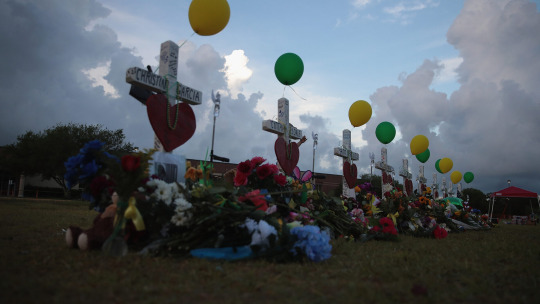
Santa Fe , Texas — May 21: Crosses line the lawn in front of Santa Fe High School on May 21, 2018 in Santa Fe, Texas. The crosses are a memorial to the victims of the May 18 shooting when 17-year-old student Dimitrios Pagourtzis entered the school with a shotgun and a pistol and opened fire, killing 10 people. Photo by Scott Olson/Getty Images
After a teenage gunman killed 10 people at Santa Fe High School in 2018, Texas lawmakers mandated that all school police officers receive training to better prepare them for the possibility of confronting a mass shooter. The law, which required that such training occur only once, didn’t apply to thousands of state and local law enforcement officers who did not work in schools.
Four years later, officers who descended on Uvalde’s Robb Elementary School, a vast majority of whom were not school police, repeatedly acted in ways that ran contrary to what active shooter training teaches, waiting 77 minutes to engage the gunman. An investigation published in December by ProPublica, The Texas Tribune and FRONTLINE revealed that about 30% of the 116 state and local officers who responded in May 2022 did not get active shooter training after graduating from police academies. Of those who had, many received such instruction only once in their careers, which at least eight police training experts say is not enough.
As part of the investigation, the news organizations conducted a nationwide analysis to examine active shooter training requirements and found critical gaps in preparedness between children and law enforcement. While at least 37 states require active shooter-related drills in schools, typically on a yearly basis, no states mandate such training for officers annually.
Instead, decisions about active shooter training are often left to individual school districts and law enforcement departments, creating a patchwork approach in which some proactively provide such instruction and others do not.
The month after the news organizations’ investigation was published, U.S. Attorney General Merrick Garland’s office released a scathing report that detailed a slew of failures during the Robb Elementary response. While visiting Uvalde, he told reporters that law enforcement agencies should immediately prioritize active shooter training.
The federal report recommended that officers receive eight hours of such instruction annually. Only Texas, however, comes close to meeting the Department of Justice’s suggested standards, according to the newsrooms’ nationwide analysis. Last year, the state mandated that all officers, not just school police, take 16 hours of active shooter training every two years.
About a dozen states also increased training requirements after the Uvalde shooting, but many continue to fall short of what police training experts say is needed.
The gaps in training requirements begin before officers’ first day on the job.
While police academies in nearly every state require some form of active shooter training, five states — California, Georgia, Ohio, Washington and Vermont — do not require it for all recruits. A spokesperson for the police standards agency in Washington did not respond to a request for comment. A Vermont spokesperson did not respond to questions about whether expanding active shooter training to all officers in police academies is being considered. Officials with police standards agencies in the other three states said they are considering adding active shooter training to their police academy curriculum.
Once officers graduate from police academies, the lack of training requirements becomes more pronounced.
Only two states — Texas and Michigan — have laws that require active shooter training for all officers once on the job. While Texas requires recurring instruction, training in Michigan is given once after officers graduate from police academies. Some states mandate active shooter training one time in a particular year, leaving out officers who were not employed at the time. Other states require training only for school police, as Texas did before the Uvalde shooting, and only two of them — Illinois and Mississippi — require it more than once.

While a majority of states require frequent active shooter-related drills in schools, 13 don’t require such instruction. They include Colorado and Connecticut, which had two of the worst mass shootings in history: the 1999 Columbine school massacre and the 2012 shooting at Sandy Hook Elementary. Spokespeople for the education departments in both states said districts are conducting drills despite the absence of a state mandate but did not provide records that confirm their assertions.
Active shooter training can be expensive, but state lawmakers should commit to providing the necessary instruction if they want law enforcement to be better prepared for a mass shooting, police training experts said. John Curnutt, assistant director at Texas State University’s Advanced Law Enforcement Rapid Response Training Center, said Uvalde is a “horrible example” of when training was needed but hadn’t been practiced enough.
“There’s a higher price that’s paid than the one that we probably could have paid upfront to get ready for it,” Curnutt said.
Statewide Active Shooter Training and Drill Requirements as of 2023
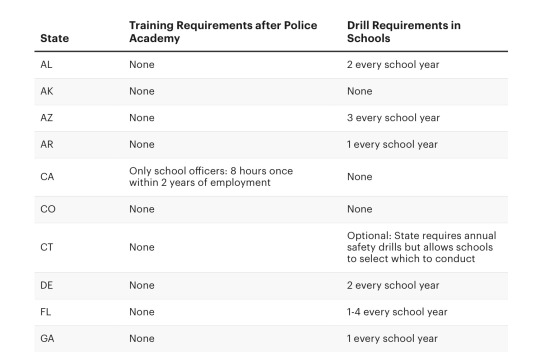

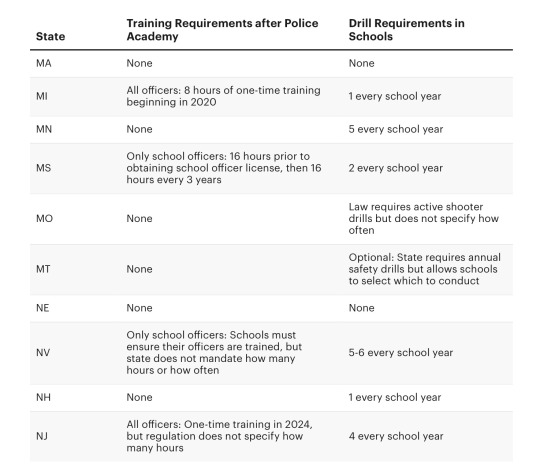
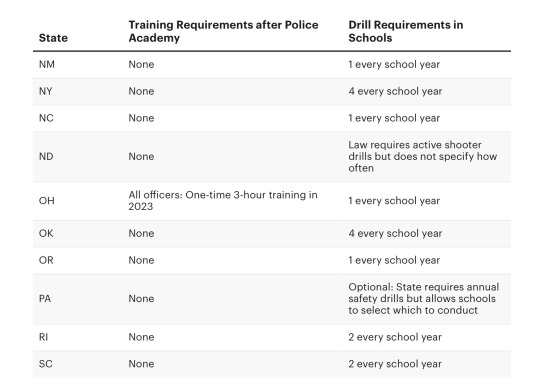
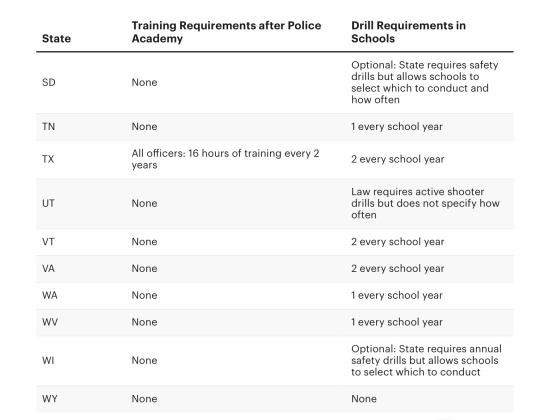
Source: State laws and regulations compiled by ProPublica, The Texas Tribune and FRONTLINE. Information is current as of December 2023. Lucas Waldron/ProPublica
About This Research:
To confirm the most up-to-date active shooter training requirements for law enforcement and schools across the country as of 2023, we contacted education departments and law enforcement standards agencies in every state. We examined both state laws and regulations.
In our analysis of schools, we included all mandated lockdown and active shooter drills, though some education departments said other types of drills can help prepare students and staff as well. In addition to the 37 states that explicitly require active shooter-related drills, we noted several others that have laws mandating safety drills but allow districts to decide which types of drills to conduct. We did not include those in our total count because the options could range from active shooter drills to earthquake drills.
For law enforcement, we collected information about how many hours of active shooter training are required for recruits going through police academies and for officers once they are on the job. We also asked for statewide data showing how many officers had taken such courses, but few states could provide that information. While we included only states’ current training mandates, four states — Alabama, North Carolina, Maine and Pennsylvania — required officers to train in a particular year but then not again, meaning that only those who were employed at that time received the one-time instruction.
— This article is produced in collaboration with ProPublica and The Texas Tribune.
#Frontline#US States#Training#Active Shooter#Requirements#Law Enforcement#ProPublica#The Texas Tribune#Lexi Churchill and Lomi Kriel#Thirteen | PBS | Frontline
0 notes
Text
A new MAGA: Mothers Against Greg Abbott mobilizes against the incumbent governor seeking a third term
A new MAGA: Mothers Against Greg Abbott mobilizes against the incumbent governor seeking a third term
A new MAGA: Mothers Against Greg Abbott mobilizes against the incumbent governor seeking a third term
By Patrick Svitek, The Texas Tribune
Aug. 11, 2022
“A new MAGA: Mothers Against Greg Abbott mobilizes against the incumbent governor seeking a third term” was first published by The Texas Tribune, a nonprofit, nonpartisan media organization that informs Texans — and engages with them — about…

View On WordPress
0 notes
Text
0 notes
Text
get my WHAT NOW

7 notes
·
View notes
Text
HB 900 passed in the Legislature and was signed by Gov. Greg Abbott earlier this year. It is set to go into effect on Sept. 1 and requires book vendors to assign ratings to books based on the presence of depictions or references to sex. In school libraries, books with a “sexually explicit” rating will be removed from bookshelves. And students who want to check out school library books deemed “sexually relevant” would have to get parental permission first.
9 notes
·
View notes
Text
A clemency petition for death row inmate Andre Thomas was filed Wednesday asking that Gov. Greg Abbott and the Texas Board of Pardons and Paroles commute the blind 39-year-old’s sentence to life in prison or grant a reprieve to determine if Thomas is competent to be executed this year.
Attached to the clemency petition were letters of support from dozens of Texas mental health professionals and more than 100 Texas faith leaders. Thomas, who first began experiencing hallucinations as a child, is facing an April 5 execution date.
“We are united in our conviction that it would be a senseless act of vengeance,” Rev. Dr. Jaime Kowlessar, senior pastor of Dallas City Temple, said during a news conference Wednesday. “The answer to violence is never more violence.”
3 notes
·
View notes
Text
Since we're heading into winter...
The Supreme Court of Texas narrowly decided Friday that sovereign immunity, which largely shields government agencies from civil lawsuits, also protects the operator of the Texas electric grid.
The 5-4 opinion will likely free the nonprofit corporation from lawsuits filed by thousands of Texans for deaths, injuries and damages following the deadly 2021 winter storm, unless lawyers find another way forward.
The Electric Reliability Council of Texas, which manages the power supply for most of Texas, qualifies for immunity because it “provides an essential governmental service,” Chief Justice Nathan Hecht wrote in the majority opinion. State law intended for ERCOT to have the power of an “arm of the State government,” Hecht wrote. If anyone is going to hold ERCOT accountable for its actions, Hecht wrote, it should be state regulators or the Legislature, not the courts.
Freezing temperatures gripped the state during the 2021 winter storm, straining the power supply so much that ERCOT called for cutting power to millions of homes and businesses to prevent the grid’s collapse. More than 200 people died. Experts estimated afterward that financial losses totaled between $80 billion and $130 billion, including physical damage and missed economic opportunity.
Thousands of residents accused ERCOT, power companies and distribution companies of failing to prepare for the freezing weather.
Lawyers expect the high court’s decision will allow ERCOT to be dismissed from the litigation, although it does not shield other defendants.
Attorney Mia Lorick, who represents some of those plaintiffs, said she sees only a slim possibility that lawyers could keep claims against ERCOT alive by arguing that their cases have differences that somehow skirt the sovereign immunity finding.
Majed Nachawati, whose firm is representing other plaintiffs in the related cases said, “The Texas Supreme Court’s decision is disappointing to say the least. People lost their lives and the only recourse to the citizens of Texas is to be able to go through the judicial process, and the judicial system, to try to remedy or right the wrong that occurred in this case. And if you can’t count on our judiciary to protect its citizens, I think we’re in a lot of trouble.”
Justices Jeff Boyd and John Devine, along with two others, disagreed that ERCOT has sovereign immunity. Purely private entities are clearly not sovereign, and making them so undermines the public trust, they wrote. The justices argued that “no statute designates ERCOT as a part of the government” and that courts should not be barred from hearing claims against it.
The ruling sprang from two cases filed against ERCOT. San Antonio’s municipally owned utility, CPS Energy, alleged that ERCOT mishandled the soaring price of power during the 2021 winter storm. And private equity investors at Panda Power Funds alleged that 10 years earlier ERCOT issued reports that misled them about how much power the grid needed.
ERCOT spokespersons issued a statement saying that the organization was pleased with the decision. CPS Energy said in a statement that it was disappointed but thankful that four justices agreed with the utility as it sought relief for customers. The utility said the litigation still led to “critical discussions at the highest levels that are necessary to improve our power grid and energy market.”
#us politics#news#texas#texas supreme court#ercot#the texas tribune#2023#Electric Reliability Council of Texas#Chief Justice Nathan Hecht#Mia Lorick#Majed Nachawati#Justice Jeff Boyd#Justice John Devine#CPS Energy#winter weather#power outages#freezing#winter
46 notes
·
View notes
Text
'No!' on travel ban
Barry Goldwater, I am supremely confident in asserting, is spinning in his grave out yonder in Arizona.
The late Arizona U.S. senator and father of the conservative movement would no doubt be aghast at what might be transpiring in Amarillo, where the city council is preparing to vote on an ordinance that would ban women from using local roads and highways to obtain an abortion out of…
View On WordPress
0 notes
Text
Interim with RGV lawmakers
#school: university of texas rio grande valley#publication: the rider#year: 2022#genre: news article#subject matter: texas tribune festival#subject matter: texas
0 notes
Text
Texas Tribune: Waiting for keys, unable to break down doors: Uvalde schools police chief defends delay in confronting gunman
Texas Tribune: Waiting for keys, unable to break down doors: Uvalde schools police chief defends delay in confronting gunman
By James Barragán and Zach Despart, The Texas Tribune
June 9, 2022
“Waiting for keys, unable to break down doors: Uvalde schools police chief defends delay in confronting gunman” was first published by The Texas Tribune, a nonprofit, nonpartisan media organization that informs Texans — and engages with them — about public policy, politics, government and statewide issues.
Editor’s note: This…

View On WordPress
0 notes
Text
Appeals Court Blocks Texas From Enforcing Book Rating Law
Victory! Appeals Court Blocks Texas From Enforcing Book Rating Law
#Texas #Books #Manga #GraphicNovels #Politics
Three months ago, Judge Alan D. Albright struck down the enforcement of HB 900 (better known as the READER ACT), which would require any vendor who wishes to sell books to the Texas Public School System to provide ratings as to the level of Sexual explicitness. Recently, the 5th Circuit Court of Appeals has blocked the Texas Education Agency from enforcing the Reader Act, dealing another blow to…

View On WordPress
#5th Circuit Court of Appeals#Books#Censorship#Graphic Novels#LGBTQIA+#Manga#Reader Act#Texas#Texas Education Agency#Texas Government#Texas Law HB 900#Texas Tribune#The Appellate Court#writing
1 note
·
View note
Video
youtube
Full documentary: Inside the Uvalde Response
FRONTLINE + @ProPublica + @texastribune
The Department of Justice released a report on Uvalde today, but this late 2023 documentary contains recordings and video footage that explains how and why the police response to the Uvalde shooting failed. It’s really something to see.
One simple example: The police inside the school assumed students and teachers attending the school had been sent home because it was so quiet inside. Super quiet. But, actually, the teachers and students had been taught during their school shooter training to be as quiet as possible. They were the only ones who actually followed their shooter training and as a result the police didn’t check the classrooms or evacuate anyone for nearly an hour.
Neither the documentary nor the DOJ report really address the question of how the shooter acquired his weapon, although the deadliness of the gun played a big part in the police decision not to confront him for over 70 minutes.
1 note
·
View note
Text
#september 2023#2023#articles#texas tribune#Alejandro Serrano#William Melhado#drag#homophobia#transphobia
0 notes
Text
Can the Center Hold?
Hurrah! It’s the fabulous Julie Mason, Texan bred, once a proud journalist at the Houston Chronicle, now working with POTUS, and with Sirius XM Radio. Line up: Kay Bailey Hutchison, former Housing and Urban Development Secretary Henry Cisneros, John H. Sununu, a former Governor of New Hampshire and White House chief of staff, U.S. Sen Evan Bayh.
The crisis in Washington: no leadership, adrift…

View On WordPress
#Evan Bayh#Governor Chris Sununu#Henry Cisneros#Julie Mason#Kay Bailey Hutchison#Texas Tribune Festival#TribFest15
0 notes